Number 14
HIMALAYAS PLUS
MAY-JUNE 2025
Hello Everyone,
Greetings from the Centre of Excellence for Himalayan Studies, Shiv Nadar Institution of Eminence (SNIoE). We are pleased to present the 14th edition of our Newsletter, covering the months of May and June 2025. Previous editions are available on our website.
PUBLICATION
CHS Associate Fellow, Dr. Devendra Kumar co-authored an article for The China Journal examining the political disenfranchisement of Tibetans in China. He and his co-author Prof. James Leibold of La Trobe University in Melbourne Australia argue that Communist Party of China’s claims of regional autonomy and preferential policies for minorities notwithstanding, actual power has increasingly shifted away from Tibetan officials to Han Chinese cadres in the Tibet Autonomous Region.
Publications by CHS Post-Doctoral Fellows took various forms. Dr. Sangay Lachenpa wrote a Commentary on Sikkim’s 50-year development journey, analysing policy gaps and cultural transitions since its statehood while Dr. Padma Ladon authored an Issue Brief assessing the erosion of local institutions in resource management practices in Leh, highlighting the socio-economic strains driven by tourism and climate change.
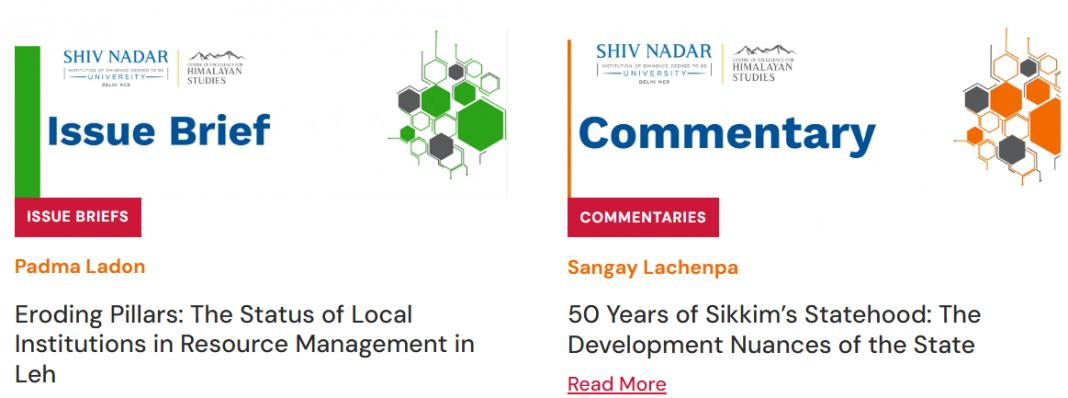
CHS Non-Resident Senior Fellow, Dr. Kalzang Dorjee Bhutia’s article titled, ‘Rituals to Make the Rain Fall on Time and Mend the Concrete Caves’ was published in Yin-Cheng Journal of Contemporary Buddhism. It examines how indigenous Buddhist communities in Sikkim ritualise care for their environment to resist extractive practices. He also contributed a chapter, ‘Kenzong Rinpoche, Precious Corn in Food Fight’ in the book, The Pilgrim Press, reflecting on the cultural and spiritual role of corn in Sikkim’s food traditions. Dr. Bhutia was also co-author of an article for Sapiens online magazine, exploring indigenous food resilience in the Sikkim and Kalimpong Himalayas.
Brig. Anshuman Narang (retd) wrote an Occasional Paper for the Centre that explores how Chinese military thinking is evolving within the People’s Liberation Army’s Western Theatre Command, and outlines several the implications for India.
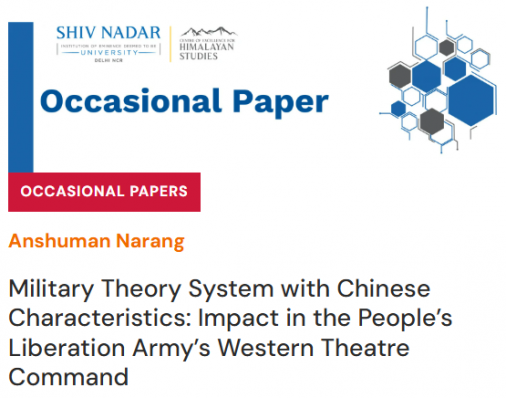
A CHS Commentary by Dr. Pintu Mahla, Research Associate, Water Resources Research Center, University of Arizona, critically examines the ecological risks posed by the suspension of the Indus Waters Treaty, raising concerns for both upstream and downstream communities, while another by Ms. Aishwarya Sanas, doctoral scholar at the Department of International Relations and Governance Studies, SNIoE, frames the International Year for Glaciers’ Preservation as a timely opportunity for India to position itself in global climate diplomacy conversations. Yet another Commentary by Ms. Akriti Sharma, doctoral scholar at the National Institute of Advanced Studies, highlights the new mountain economy focus of the BIMSTEC regional organization, arguing that the approach is both welcome and essential.

CHS Director, Dr. Jabin T. Jacob wrote a piece for the foreign policy magazine, India’s World, analysing shifts in China’s "wolf warrior diplomacy".
IN THE MEDIA
Writing for The Tribune, Dr. Jabin T. Jacob analyses China’s calculated neutrality after the Pahalgam attack, noting how it subtly hyphenates India and Pakistan while avoiding blame on Islamabad. He was also quoted in StratNews Global on China’s apparently muted tone on the anniversary of the Galwan incident this year.
Dr. Devendra Kumar published in The Policy Circle on the China’s national security white paper, and also spoke about it in a podcast by the Centre for Land Warfare Studies .
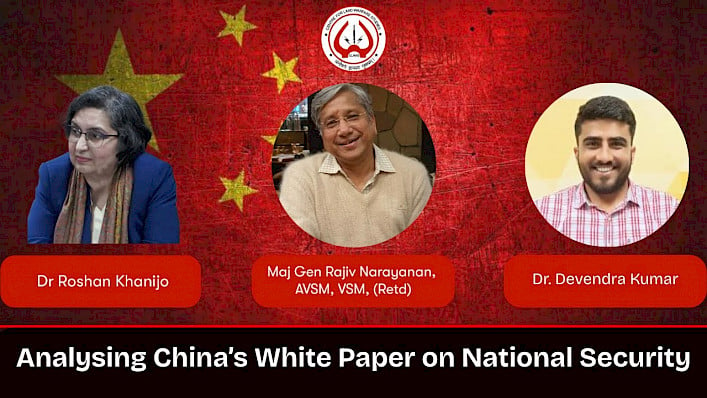
CHS Non-Resident Senior Fellow, Prof. Kaveri Gill contributed a piece for The Tribune on the Bodh Gaya sacrilege incident and how it damages India’s Buddhist soft power. The current issue of Biblio also carries her review of the latest memoirs of the Dalai Lama, Voice for the Voiceless: Over Seven Decades of Struggle with China for My Land and My People.
CHS Distinguished Fellow, Mr. Claude Arpi contributed multiple opinion pieces to Firstpost in May and June. He examined the West’s enduring anti-India bias on Kashmir, outlined India’s strategy to counter China’s sinister renaming of Tibetan places, argued for China’s recognition of India’s rights on Indus waters instead of siding with Pakistan, and reflected on Beijing’s anxieties over the Dalai Lama’s succession. He also wrote for Deccan Chronicle on reviving Nalanda’s historic legacy. For France’s Le Figaro, he also wrote a piece on how China is using ecological rhetoric to justify its hydropower expansionism in Tibet.
FACULTY UPDATE
Mr. Claude Arpi was interviewed by Samvad on the Dalai Lama’s succession and on China’s use of the Panchen Lama in this regard. He also spoke at a conference on the theme, ‘Interwoven Roots: The Shared Indo-Tibetan Heritage’, organised by Indian Army’s Central Command and ARTRAC, in Shimla. At the event, he spoke on ancient Western Tibetan kingdoms, Indo-Tibetan cultural ties, and ideas for a new era of engagement. Following this, he was widely quoted in several media outlets, including ANI News , LatestLY , Hindustan Times , The Tribune , The Indian Express , Devdiscourse , Social News XYZ, News Views Post , msn, The News Mill, Daily Excelsior , Free Press Kashmir , News Arena and Amar Ujala — offering insights on China’s interference in Tibetan spiritual traditions and the political significance of the Dalai Lama’s succession.
Dr. Jabin T. Jacob was a panellist at a meeting on the Shanghai Cooperation Organization, organised by the Institute for Advanced International Studies, University of World Economy and Development, Tashkent, the Shanghai Academy of Social Sciences, and Fudan University, where he addressed the question, ‘Is Regional Cooperation Possible Without Bilateral Cooperation?’
Dr. Anand P. Krishnan, CHS Fellow spoke in a closed-door seminar about Chinese capital in India’s electronics industry, organised by the Centre for Social and Economic Progress, New Delhi.
Prof. Kaveri Gill delivered a talk at a workshop hosted by IIT Kanpur titled, ‘Waste Policy and Practice in the Himalayas’.
Dr. Padma Ladon presented a paper titled, ‘Bricks versus Barley: Emergence and Extent of Top-Soil Extraction in Ladakh, India’ at the Annual Meeting of the Arbeitskreis Hochgebirge (Association of Mountain Research), held in Bayreuth, Germany. She also conducted fieldwork in villages within Hemis National Park, Ladakh, focusing on tourism’s impact on local livelihoods.
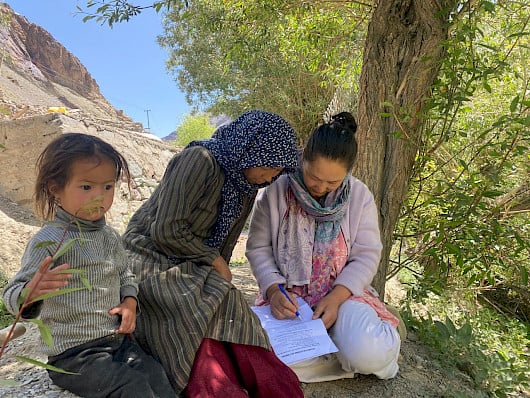
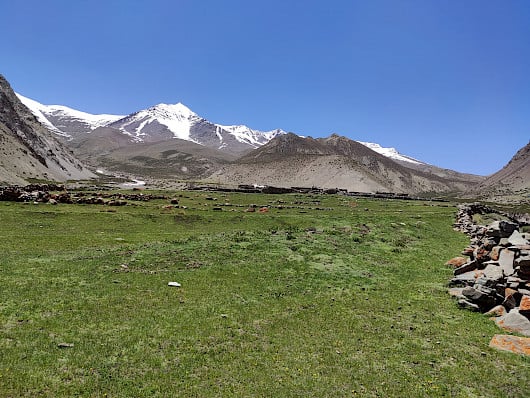
Dr. Devendra Kumar presented a paper titled, ‘China’s Approaches to Border Governance: A Case of Non-Traditional Security Threats along Tibetan Borderlands’ at a one-day workshop on Non-Traditional Security and Borders, organised by the South Asia University, New Delhi.
You can stay updated with our publications, events, and activities through our website, X (@Himalayas_SNU), Facebook, and LinkedIn. You can also find previous Newsletters on our website.
Share this: